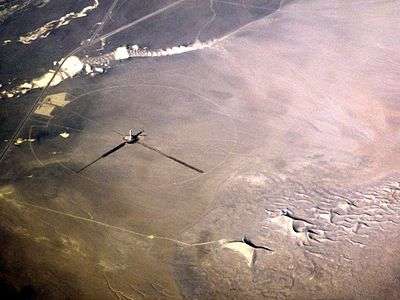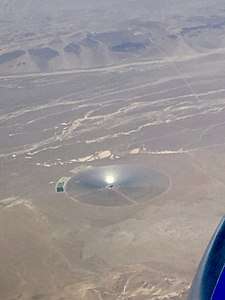Crescent Dunes Solar Energy Project
The Crescent Dunes Solar Energy Project is a solar thermal power project with an installed capacity of 110 megawatt (MW)[3] and 1.1 gigawatt-hours of energy storage[1] located near Tonopah, about 190 miles (310 km) northwest of Las Vegas.[4][5] Crescent Dunes was the first concentrated solar power (CSP) plant with a central receiver tower and advanced molten salt energy storage technology.
| Crescent Dunes Solar Energy Project | |
|---|---|

| |
| Country | United States |
| Location | Tonopah, Nye County, Nevada |
| Coordinates | 38°14′00″N 117°22′01″W |
| Status | Mothballed |
| Construction began | 2011 |
| Commission date | 2016[1] |
| Construction cost | $0.975 billion |
| Owner(s) | Tonopah Solar Energy, LLC (SolarReserve, LLC) |
| Solar farm | |
| Type | |
| CSP technology | Solar power tower |
| Collectors | 10347 × 115.72 m² |
| Total collector area | 296 acres (1,200,000 m2) |
| Site resource | 2,685 kW·h/m2/yr[2] |
| Site area | 1,670 acres (676 ha) |
| Power generation | |
| Units operational | 1 |
| Make and model | Alstom |
| Nameplate capacity | 110 MW |
| Capacity factor | 51.9% (planned) 20.3% (2018) |
| Annual net output | 196 GW·h over 1 year (2018) |
| Storage capacity | 1,100 MW·he |
| External links | |
| Website | Crescent Dunes |
| Commons | Related media on Commons |
Startup energy venture company SolarReserve, created via seed funding by US Renewables Group and United Technologies, was the original owner of Tonopah Solar Energy LLC, the owner and operator of the Crescent Dunes plant. The Crescent Dunes project was subsequently backed by a $737 million in U.S. government loan guarantees and by Tonopah partnering with Cobra Thermosolar Plants, Inc. The overall venture had a projected cost of less than $1 billion.[6][7] The plant suffered several design, construction and technical problems, only achieving about a 20% capacity factor in 2018, resulting in lawsuits and changes of control.[8][9][10] The Crescent Dunes site has not produced power since April 2019 and its sole customer, NV Energy, subsequently terminated their contract.[11]
Since the initial failure of the Crescent Dunes project, SolarReserve took down their website and were believed to have permanently ceased operations.[12][13] Upon the developer's silence as the involved parties sought legal recourse, the plant's exact status was publicly unknown for some time and was left to conjecture.[14]
Currently proceeding through its subsequent bankruptcy proceedings, Tonopah Solar Energy has stated it has hopes for a restart of the Crescent Dunes plant by the end of 2020.[15][16] According to court documents, Tonopah is owned by SolarReserve, Cobra Energy Investment LLC, a division of Spanish construction company ACS Group and Banco Santander, S.A..[17] If the bankruptcy settlement is approved, Cobra will have operational control of the plant.[18]
History
In late September 2011 Tonopah Solar Energy received a $737 million loan guarantee from the United States Department of Energy (DOE) and [4] the right to build on public land.[19] The capital stack included $170,000,000 in EB-5 investment through SolarReserve/ACS Cobra partner CMB Regional Centers.[20][21][9] Under a power purchase agreement (PPA) between SolarReserve and NV Energy, all power generated by the Crescent Dunes project in the next 25 years would have been sold to NV Energy for $0.135 per kilowatt-hour.[7]
Ground was broken on the project in September 2011.[22] Construction terminated at the end of 2013, followed by several months of testing the plant systems. The project entered commissioning phase in February 2014 following completion of construction.[23] It began operation in September 2015,[24] but went off-line in October 2016 due to a leak in a molten salt tank. The owners warned the EPC about flaws in the salt tank foundations (and other matters) with formal comments lodged on the record in March 2012 progress meeting with DOE and its engineer present (the lender did not voice any objection). It returned to operation in July 2017.[25]
NV Energy—the project's sole customer—terminated its contract in October 2019 on the basis of the project having "failed to produce." Alleging a takeover of Tonopah Solar Energy by the DOE,[26] SolarReserve then raised the possibility of the project filing for bankruptcy, which subsequently happened.[27][28] SolarReserve also filed a lawsuit, claiming that the Department of Energy was looking to appoint two new members to Tonopah Solar Energy’s board of managers, giving the appearance of the Energy Department in complete control of Tonopah directors which comprise the entirety of the Tonopah Board of Managers.[26] An interim outcome in this regard was that SolarReserve took down their website and was believed to have ceased operations permanently.[29]
Tonapah Solar Energy filed for bankruptcy on July 30, 2020.[30] Pending the approval of the bankruptcy court, a $200 million settlement with the remaining debtors — Tonopah Solar Energy LLC and ACS Cobra — for the return of taxpayer dollars was also announced at the end of July 2020.[31] The amount is less than half of what taxpayers are owed on the outstanding $425 million of public debt.[32] Under the settlement agreement and as a function of subsequent repairs, restoration of the plant to power production and acquisition of new long-term customers, ACS Cobra is liable for an additional $100 million in otherwise suspended debt.[33]
Technology
The project's EPC Contractor was ACS Cobra, which carried out the engineering design, procured the equipment and materials necessary, and then constructed and delivered the facility to Tonopah Solar Energy. The project includes 10,347 heliostats that collect and focus the sun's thermal energy to heat molten salt flowing through an approximately 656-foot (200 m) tall[34] solar power tower. Each heliostat is made up of 35 6×6 feet (1.8 m) mirror facets, yielding a heliostat overall usable area of 1,245 square feet (115.7 m2). Total solar field aperture adds up to 12,882,015 square feet (1,196,778 m2). The molten salt circulates from the tower to a storage tank, where it is then used to produce steam and generate electricity.
Excess thermal energy is stored in the molten salt and could be used to generate power for up to ten hours, including during the evening hours and when direct sunlight is not available.[4] The storage technology thus eliminated the need for any backup fossil fuels, such as natural gas. Melting about 70,000,000 pounds (32,000,000 kg) of salt took two months. Once melted, the salt stays melted for the life of the plant and is cycled through the receiver for reheating.[35]
Maximum actual energy output that accounts for maintenance (i.e., capacity factor) was re-estimated at 500 GWh annually,[36] though the highest producing year thus far, 2018, only attained 40% of that.
Production
Crescent Dunes began operation in September 2015,[24] but went off-line in October 2016 due to a leak in a molten salt tank. It returned to operation in July 2017.[25] While its average monthly production was expected to exceed 40,000 MWh, as of May 2019 it never reached that value and only exceeded half of it during 9 months.[37]
| Year | Jan | Feb | Mar | Apr | May | Jun | Jul | Aug | Sep | Oct | Nov | Dec | Total |
|---|---|---|---|---|---|---|---|---|---|---|---|---|---|
| 2015 | 1,703 | 1,831 | 0 | 3,534 | |||||||||
| 2016 | 1,508 | 9,121 | 7,099 | 2,158 | 11,485 | 6,216 | 25,560 | 28,267 | 30,514 | 5,410 | 0 | 0 | 127,338 |
| 2017 | 0 | 0 | 0 | 0 | 0 | 0 | 9,420 | 9,192 | 13,666 | 9,263 | 488 | 0 | 42,029 |
| 2018 | 795 | 5,145 | 5,907 | 13,801 | 10,653 | 33,387 | 23,749 | 33,169 | 31,632 | 21,253 | 8,130 | 8,189 | 195,810 |
| 2019 | 12,889 | 14,431 | 20,041 | 2,807 | mothballed | 50,168 | |||||||
| 2020 | mothballed | 0 | |||||||||||
| Total (2015-2019) | 418,879 | ||||||||||||
The commissioning of a new thermal power plant requires a four to six months from the first grid connection to full production. At Crescent Dunes, it was to be expected a similar progression, but the failure of the storage tanks in 2016 due to a documented design flaw, froze the commissioning.[39] Following that, first full production year was delayed to 2018, starting with a 40% (200 over 500) output.
Shutdown
The first three months of 2019 (January, February and March) showed good progression, topping all previous monthly data, but in April the plant was shut down because the project's sole buyer, NV Energy, terminated the Power Purchase Agreement for failure to produce the contracted power production. The power generated also cost NV Energy about $135 per megawatt-hour, compared with less than $30 per MWh available from a new Nevada photovoltaic solar farm.[40][41] But the Tonopah solar project power is dispatchable whilst photovoltaic power is intermittent. It is inappropriate to compare intermittent generating technologies, like wind and solar, with dispatchable generating technologies like nuclear, gas combined cycle, and coal. Crescent Dunes project is more on the conventional type of generation. The difference between the noon low hourly prices and the evening high hourly prices, can be up to four orders of magnitude, if capacity payments for generating capacity available to supply power during peak hours is included.[42]
Gallery
 2012 January - The solar tower under construction as seen from a commercial airliner. The titular Crescent Dunes are at lower right.
2012 January - The solar tower under construction as seen from a commercial airliner. The titular Crescent Dunes are at lower right.- 2014 August - Completed site as seen from a commercial airliner.
 2016 August - Crescent Dunes in operation as seen from a commercial airliner.
2016 August - Crescent Dunes in operation as seen from a commercial airliner.
See also
Notes
- "Crescent Dunes 24-Hour Solar Tower Is Online". CleanTechnica. 22 February 2016. Retrieved 15 June 2016.
- Crescent Dunes Solar Energy Project, National Renewable Energy Laboratory
- "Crescent Dunes Solar Thermal Power Plant". Grupo COBRA. 2016. Archived from the original on 4 June 2016. Retrieved 26 May 2019.
- "Energy Department Finalizes $737 Million Loan Guarantee to Tonopah Solar Energy for Nevada Project" (Press release). Loan Programs Office (LPO), Dept. of Energy (DOE). 28 September 2011. Retrieved 2 July 2014.
- "Crescent Dunes: Project Under Construction". Loan Programs Office (LPO), Dept. of Energy (DOE). 1 September 2015. Retrieved 17 January 2016.
- https://www.swfinstitute.org/news/80796/us-taxpayer-backed-tonopah-solar-energy-files-for-bankruptcy-protection
- Wesoff, Eric (29 September 2011). "DOE Races Against the Clock: Two Solar Loans Closed, Seven More to Go". Greentech Media. Retrieved 29 September 2011.
- Solar Power - Solar Power Plant,www.popularmechanics.com
- NV Energy sends termination notice to massive Tonopah solar project, developer accuses Energy Department of taking over
- Future of Crescent Dunes solar plant near Tonopah appears bleak
- Nye solar plant could be facing a crisis
- America’s Concentrated Solar Power Companies Have All but Disappeared
- https://www.evwind.es/2020/02/07/the-closure-of-solarreserve-an-isolated-case-of-the-concentrated-solar-power-industry/73461
- https://www.bloomberg.com/news/articles/2020-01-06/a-1-billion-solar-plant-was-obsolete-before-it-ever-went-online
- https://www.law360.com/delaware/articles/1297268/bankrupt-solar-project-owner-hopes-for-year-end-restart
- https://pv-magazine-usa.com/2020/08/03/post-bankruptcy-and-doe-loan-owner-of-crescent-dunes-wants-csp-plant-online-by-years-end/
- https://pvtimes.com/news/tonopah-solar-energy-files-for-bankruptcy-87661/
- https://pv-magazine-usa.com/2020/08/03/post-bankruptcy-and-doe-loan-owner-of-crescent-dunes-wants-csp-plant-online-by-years-end/
- Chris Martin; Nic Querolo (6 January 2020). "A $1 Billion Solar Plant Was Obsolete Before It Ever Went Online". Bloomberg. Retrieved 5 February 2020.
Harry Reid, then the Senate majority leader and senior senator from Nevada, cleared the way for the company to build on public land
- "Group IX – Crescent Dunes". www.cmbeb5visa.com. Archived from the original on 2017-03-28. Retrieved 2017-03-27.
- "Nhóm XI – ACS Cobra". www.cmbeb5visa.com. Archived from the original on 2017-03-28. Retrieved 2017-03-27.
- Tetreault, Steve (28 September 2011). "Nevada solar project to get $737 million federal loan guarantee". Las Vegas Review-Journal. Retrieved 29 September 2011.
- "Crescent Dunes Solar Energy Project, Nevada, United States of America". Retrieved 29 December 2016.
- National Renewable Energy Laboratory (10 November 2015). "Crescent Dunes Solar Energy Project".
- Las Vegas Review-Journal (21 July 2017). "Nevada solar plant back online after eight-month outage".
- Schulz, Bailey (7 October 2019). Cook, Glenn (ed.). "Tonopah solar plant could end up in bankruptcy, developer says". www.reviewjournal.com. Las Vegas: J. Keith Moyer. Archived from the original on 8 October 2019. Retrieved 26 February 2020.
major decisions — such as bankruptcy proceedings — require a unanimous vote from the managers, the lawsuit alleges that the Energy Department can determine the fate of Tonopah Solar Energy without any representation of SolarReserve on the board
- Will DOE take the Crescent Dunes solar project into bankruptcy?
- SOLARRESERVE CSP HOLDINGS vs.TONOPAH SOLAR ENERGY, LLC - Docket No.2019-0791
- https://www.evwind.es/2020/02/07/the-closure-of-solarreserve-an-isolated-case-of-the-concentrated-solar-power-industry/73461
- https://pvtimes.com/news/tonopah-solar-energy-files-for-bankruptcy-87661/
- https://www.reviewjournal.com/news/politics-and-government/200m-settlement-announced-over-bankrupt-tonopah-solar-project-2084328/amp/
- https://www.wsj.com/articles/energy-department-poised-to-lose-up-to-225-million-on-solar-project-bankruptcy-11596145244
- https://www.eenews.net/stories/1063659143
- https://www.evwind.es/2020/02/07/the-closure-of-solarreserve-an-isolated-case-of-the-concentrated-solar-power-industry/73461
- Hashem, Heba (4 April 2014). "No drama as SolarReserve commissions world's largest CSP tower with storage". CSP Today Business Intelligence. FC Business Intelligence Limited. Retrieved 6 May 2014.
- "Crescent Dunes". www.solarreserve.com. Archived from the original on 14 August 2017. Retrieved 17 October 2017.
- SolarReserve still falling short at flagship solar tower project
- "Crescent Dunes Solar Energy, Monthly". Electricity Data Browser. Energy Information Administration. Retrieved October 8, 2019.
- Salt leak shuts down Crescent Dunes Concentrated Solar Power plant
- A $1 Billion Solar Plant Was Obsolete Before It Ever Went Online
- NV Energy sends termination notice to massive Tonopah solar project, developer accuses Energy Department of taking over
- Comparing the Costs of Intermittent and Dispatchable Electricity Generating Technologies
External links
| Wikimedia Commons has media related to Crescent Dunes Solar Energy Project. |
- "Crescent Dunes Solar Energy Project". SolarReserve, LLC. Retrieved 28 April 2015.
- "Crescent Dunes Solar Energy Project". Concentrating Solar Power Projects. National Renewable Energy Laboratory (NREL), DOE. 20 January 2011. Retrieved 29 September 2011.
- "SolarReserve, LLC (Crescent Dunes)". Projects. LPO, DOE. Retrieved 16 September 2014.
- "American Recovery and Reinvestment Act (ARRA) Loans - Award Summary: Tonopah Solar Energy, LLC". Recovery.gov. 21 September 2011. Archived from the original on 14 July 2014. Retrieved 2 July 2014.